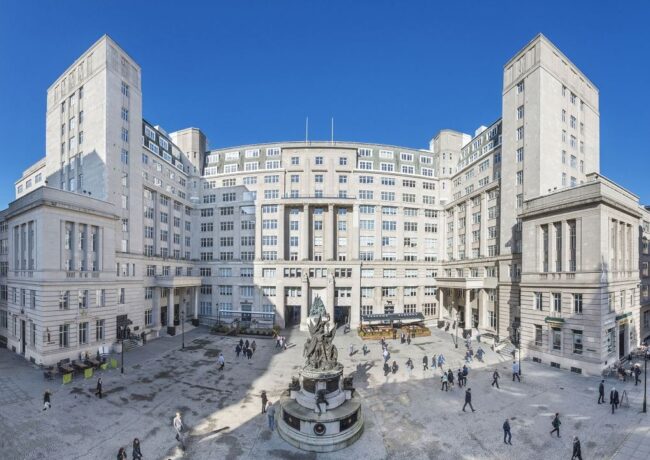Deloitte to close Liverpool office
The global professional services firm is to close its 7,800 sq ft office at Exchange Flags in response to changing ways of working expediated by Covid-19.
Deloitte employs around 65 staff in the Liverpool office, all of whom have been offered full-time remote working roles, the company said.
Stephen Griggs, Deloitte UK’s managing partner, said: “Covid-19 has fast-tracked our future of work programme, leading us to review our real estate portfolio and how we use our offices across the UK, including London.”
As well as its Liverpool office, the company is closing three more sites across the country in Southampton, Gatwick and Nottingham.
Deloitte, which last month reported a 16% drop in profits for the 12 months ended May 2020, has 50 offices in the UK and employs around 20,000 people nationally.
All of Deloitte’s UK staff are currently working from home in line with Government guidance.
Griggs said: “Everyone based in [Liverpool, Nottingham, Gatwick and Southampton] will continue to be employed by Deloitte and any proposed change is to our ‘bricks and mortar’ [portfolio], not our presence in these regions.
“We remain committed to these regional markets and will continue our close relationships with our clients, society partners and communities, just without a physical building.”
It is understood that Deloitte, one of the Big Four professional services firms, still has a year to run on its lease at Exchange Flags and may seek an early surrender of the terms of its contract.
Exchange Flags is owned by Israeli property firm Ashtrom Properties, which bought the 360,000 sq ft building for £68m from Shelborn Asset Management last year.
Worthington Owen is the letting agent for Exchange Flags.
The news of Deloitte’s Liverpool exit comes in the month after telecommunications firm BT decided to shelve a deal to take 80,000 sq ft at CTP and Kier Property’s Pall Mall in Liverpool.





This is the future, cities are over. Remote working and business parks with ample parking are the future.
By Dan
@Dan Apart from the big 3 of London, Birmingham, Manchester (Edinburgh or Glasgow in Scotland) I think you are correct. Big business will look to consolidate their operations in a few key business hubs, have everyone else working from home and occasionally going into which ever hub office is closest to them.
By Bob
Everyone currently working may continue to keep their jobs, but future ones will be advertised for their Manchester office.
If cities were truly “over” then various developers wouldn’t be coming forward with further large office blocks for Manchester. What is happening at present is what always happens when tough times arrive: the weakest suffer the most. And Liverpool has very much been weakened over the past decade.
The city region authorities need to get tough with Anderson’s stronghold over the central economy and sort things out before structural unemployment of 30% and up arrives.
By Mike
100% correct Dan
By LionelRichTea
@Dan:
This is the future, commuting by car should be over. Remote working and places with ample bicycle parking are the future.
By W
Just stating a fact – isn’t it just that Liverpool has no potential market area to the West (that can’t be reached other than by boat?)
By ChesneyT
“We remain committed to these regional markets and will continue our close relationships with our clients, society partners and communities, just without a physical building.” Absolute rubbish. If that’s the case and rationale then why aren’t you closing many more offices? This is very much a snub to those markets and local business should vote with their feet
By CW
I don’t see a quick way back for central business districts. The genie’s out of the bottle.
By Mark Gilbertson
Another nail in the coffin of Liverpool, not to worry they’ve got the e scooters.
By MFH
I imagine they will keep their Spinningfields office open though?
By Priorities
Regardless to what anyone thinks of Deloitte, for a firm to have 50 UK offices, but not one in Liverpool is concerning for the city.
By Anonymous
Seems a bit strange just to target the 65 staff based in Liverpool as it appears they have over 600 staff down the M62, also they say those 65 staff will work remotely and not be laid off.
By Anonymous
Cities are over? What a childish and nonsensical statement.
By Anonymous
Dan, maybe you’re forgetting that humans are just mammals, like many others, that like to live in groups for support and interaction. Admittedly there’s always the odd lone wolf though that hangs around looking in on the rest of the pack.
By Sam
Well that just about caps it , first BT and now Deloitte closing major offices in Liverpool. Working from home will work in the short term but as soon as the worst of Covid is over you can can Guarantee those workers will be forced to travel to Manchester. Funny they have not closed or cancelled either of those offices?
By Wirralwanderer
I work on a business park in Altrincham . Soulless depressing place full of of soulless depressed people . Anyone with any life in them at all wouldn’t dream of working in a Business Park.
By Realist
WW2 and demolished city centres didn’t end the trend for humans to pull toward urban centres, especially among the young. COVID is a short term urban rethink and is accelerating some pre-COVID trends. Accountants will not win the argument on the cost of floorspace forever.
By Anonymous
Very disappointing to see another big firm leaving Liverpool,
By Liverpolitis
It’s the winding down of Liverpool
By George
This is devastating news for the city.
By Anonymous
Not sure cities are over, or that business parks where ever a good idea, but you can see a pretty obvious consolidation into regional hubs like Manchester, Birmingham, Leeds and Bristol
By Rich X
Wow, some people can’t face facts.
By Dan
Absolutely right about regional consolidation into hubs. It’s Been a BT Strategy for years. HMRC are doing the same as are Deloitte and some of the big Tech firms like Amazon , Google and HP. There will have to be a greater willingness from these big firms to allow people to work from home sometimes but I have no doubt having been involved in this type of consolidation over many years that when they want to ‘right size’ one way of getting people to go is to force them to travel for miles everyday….it works a treat.
By Cityscape
As someone who is currently working from home (usually work in Manchester City Centre) I fully expect city centres to recover. It will take time, but they will recover.
Speaking to my colleagues and some friends who are also working from home, the overwhelming consensus seems to be that people cannot wait to get back in the office. There is the odd person who would like to be home based permanently but are definitely in the minority.
By Manc Man
Usual nonsense talked by the usual suspects about cities. I guess some people just haven’t been around long enough to form a cogent opinion about what is happening and what will happen in the coming years.
By Anonymous
We all like the idea that our respective cities are the natural hubs for UK firms with national footprints, but we’ll only achieve true resilient prosperity when we crack new business formation. Firms born and bred in Liverpool and Manchester are the true engines of wealth creation, have enough of them and the professional services firms will naturally cluster around. Kind of struggle with the Liverpool/Manchester zero sum thinking, a good chunk of either city is able to work in the other, and that’s a great thing for the NorthWest, not a bad thing.
By Rich X
I find the situation with the port more alarming than these office closures. 21000 checks on goods post brexit and today its 2000 checks, the consequences are that the port goes out of business. That is what I read, however there was no mention of any other ports?. Surely it would be the same situation in say Immingham or Felixstowe?
By Robert Fuller
You could argue that Liverpool’s economy is still in the process of right sizing after a century of extracting value from empire trade. When the British empire declined so did the fortunes of cities that depended on it. Unfortunately and unlike Bristol or Glasgow, Liverpool produced very little thus its economy is that much less resilient and its scientific and innovation eco system much less well developed the other big cities. These closures are simply the legacy of that economic history echoing down the ages, not helped by of course by a council that seems to lack vision.
By Sleepz
Cities are more than office blocks, they’re cultural centres, places to live in and far from over. Liverpool is doing just fine and needs to break free of over-zealous heritage restrictions.
By Replying to Nonsense
If workers had any leverage and made businesses rightly fund the ability for staff to work home, they would reconsider. To be clear I’m not talking a desk and chair, an extra room in reality is the bare minimum.
By Jamie
Clearly, in such times, offices can be substituted by working from home, like growing your own vegetables from home helped us to survive during the war. The first casualties in such times are companies providing “non-essential” services, such as those managing office portfolios, such as Deloitte and the likes.
By WME
Liverpool has always been a branch plant city and always suffers from business consolidation when the National economy starts struggling. With a no-deal brexit looming, expect COViD to rationalise a lot of these sort of decisions – and not just in Liverpool either
By Barm cake
Liverpool has alot going for it in terms of being in a vibrant city but access to open space. So much coastline nearby. If that’s the trend. It has alot of potential for healthier living.
By Anon
The right balance from now on would be working from home 2 days a week and in the office 3 days a week.
By John
Another plus for the city up the M62. Liverpool needs to address this.
By Michael McDonut
The only surprise is that this took so long. There was never a great deal happened out of the Deloitte Liverpool office. Those who chose to be based there sometimes ended up spending a lot of time in Manchester anyway or client sites as far as Leeds.
By Insider
Where’s the pushback from the likes of the local BID on stuff like this? If there’s consolidation by more international companies to regional hubs then this could become a dangerous trend for Liverpool. A failure to invest in the growth of local businesses of all sizes over the years furthers our exposure to this type of decision.
By Mark Gilbertson
That is a great looking building though, and the kind that sadly no one can afford to build anymore.
By Nve.